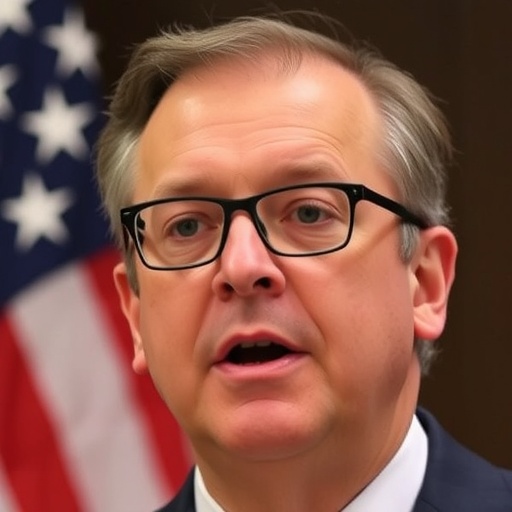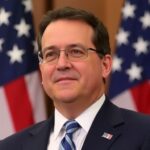Trump Nominee Paul Ingrassia Under Fire: Racist Texts and Nazi References Threaten Senate Confirmation
In a stunning revelation that has ignited a firestorm in Washington, President-elect Donald Trump’s nominee for the Office of Special Counsel, Paul Ingrassia, is facing intense scrutiny after private text messages surfaced, exposing deeply troubling racist remarks, including a self-proclaimed ‘Nazi streak’ and calls to eliminate the Martin Luther King Jr. holiday. Published by Politico on Wednesday, these texts have thrust the Trump nominee into the center of a burgeoning controversy, raising serious questions about his fitness for a role tasked with investigating federal employee misconduct.
- Shocking Texts Surface: ‘Nazi Streak’ and MLK Holiday Attacks
- Civil Rights Leaders Mobilize Against Ingrassia Nomination
- Ingrassia’s Past: From Fringe Activist to Trump Inner Circle
- Senate Showdown: Republicans Grapple with Confirmation Hurdles
- Trump’s Strategy and the Road Ahead for Controversial Picks
The disclosures come at a critical juncture, just weeks before Trump’s inauguration, as Senate Republicans hold a slim majority that could make or break Senate confirmation. Civil rights groups are mobilizing, demanding the nomination be withdrawn, while Ingrassia’s supporters dismiss the messages as out-of-context jokes from his younger years. This scandal not only spotlights Ingrassia’s past but also tests the boundaries of tolerance for inflammatory rhetoric in high-stakes political appointments.
Shocking Texts Surface: ‘Nazi Streak’ and MLK Holiday Attacks
The controversy erupted when Politico obtained a trove of text messages from 2018, exchanged among a group of young conservative activists, including Ingrassia, then in his early 20s. In one particularly alarming exchange, Ingrassia reportedly wrote, “I’ve got a Nazi streak in me,” in response to a discussion about historical figures and political ideologies. The message was part of a broader conversation that veered into territory laden with white nationalist undertones, according to sources familiar with the chats.
Adding fuel to the fire, another text from Ingrassia called for the abolition of the federal Martin Luther King Jr. Day holiday, labeling it a ‘waste of time’ and suggesting it be replaced with a celebration of Confederate leaders. “Why honor a plagiarist and adulterer when we could celebrate real American heroes?” he allegedly texted, referencing baseless smears against the civil rights icon that have long been debunked by historians.
These racist texts were not isolated incidents. Politico’s reporting detailed a pattern: Ingrassia frequently used slurs and made jokes about minorities, including derogatory comments about Black Lives Matter protesters during the 2020 racial justice uprisings. One message mocked George Floyd’s death, quipping, “Another one bites the dust,” a reference to the Queen’s song twisted into something profoundly insensitive.
Experts in digital forensics confirmed the authenticity of the messages to Politico, noting they were preserved in a group chat that included other rising conservative figures who have since distanced themselves. The texts, spanning over 500 pages, paint a picture of a young man immersed in fringe online communities, where such rhetoric was normalized among peers.
Civil Rights Leaders Mobilize Against Ingrassia Nomination
The backlash has been swift and fierce, with civil rights organizations leading the charge. The NAACP issued a statement Thursday morning, calling the texts “a blatant display of white supremacy that disqualifies Ingrassia from any public service role.” Executive Director Derrick Johnson emphasized, “Nominate someone who jokes about Nazis to oversee federal ethics? This is a dangerous precedent that erodes trust in our institutions.”
The Southern Poverty Law Center (SPLC) went further, labeling Ingrassia a “potential threat to workplace protections for marginalized employees.” In a detailed report released hours after Politico’s story, the SPLC highlighted how the Office of Special Counsel (OSC) handles complaints of discrimination and retaliation in the federal workforce. “If confirmed, Ingrassia could undermine investigations into racism, exactly when we need them most,” the report stated.
Prominent voices echoed these sentiments. Rev. Al Sharpton, founder of the National Action Network, announced plans for protests outside the Senate Judiciary Committee hearings. “This isn’t just about one man’s words; it’s about the soul of America,” Sharpton said in a televised interview. “Trump’s team must reject this poison before it poisons the well of justice.”
Public reaction on social media has amplified the outcry, with #FireIngrassia trending nationwide. Over 50,000 signatures have been collected on a Change.org petition urging senators to block the nomination, citing the texts as evidence of bias unfit for a neutral arbiter.
Ingrassia’s Past: From Fringe Activist to Trump Inner Circle
To understand the depth of this controversy, one must trace Paul Ingrassia‘s trajectory. Born in 1997 in a middle-class suburb of Chicago, Ingrassia emerged as a prodigy in conservative circles during his college years at the University of Illinois. He gained notoriety for organizing events with speakers from the alt-right spectrum, including appearances by figures later banned from platforms for hate speech.
By 2020, Ingrassia had pivoted to legal work, clerking for a federal judge known for tough stances on immigration. His rapid rise caught the eye of Trump’s transition team, where he contributed to vetting processes for judicial nominees. Insiders describe him as “sharp but polarizing,” with a knack for meme-driven social media campaigns that boosted MAGA messaging.
The OSC role, which Ingrassia was tapped for in November 2024, is no small post. The independent agency, established in 1978, investigates over 10,000 whistleblower claims annually and enforces the Hatch Act, which prohibits political activities by federal employees. In 2023 alone, OSC recovered $50 million in wrongful termination settlements, many involving discrimination claims. Critics argue that Ingrassia’s history could bias these efforts.
Defenders, including some Trump allies, point to his youth at the time of the texts—Ingrassia was 21—and argue for redemption. A spokesperson for the Trump transition team released a brief statement: “Paul has grown immensely and is committed to upholding the law impartially.” Yet, this has done little to quell the storm.
Senate Showdown: Republicans Grapple with Confirmation Hurdles
As the Senate confirmation process looms, the texts have fractured GOP ranks. Senate Majority Leader John Thune (R-SD) expressed “concern” in a Fox News appearance, saying, “We take these allegations seriously and will review them thoroughly during hearings.” Moderates like Sen. Susan Collins (R-ME) have signaled reservations, with Collins tweeting, “Racist rhetoric has no place in federal leadership. I look forward to questioning Mr. Ingrassia directly.”
Democrats, now in the minority, are seizing the moment. Senate Minority Leader Chuck Schumer (D-NY) demanded an immediate hearing, stating, “This nomination is a litmus test for whether the Senate will tolerate bigotry in the Trump era.” Ranking members on the Homeland Security and Governmental Affairs Committee, which oversees OSC nominations, have requested all communications from Ingrassia’s past, including his social media history.
Historical precedents abound: In 2017, Trump’s labor secretary nominee withdrew amid ethics scandals, and more recently, several Biden picks faltered over past writings. Political analysts predict Ingrassia’s fate hinges on Trump’s influence— the president-elect has a track record of standing by controversial figures, from Steve Bannon to Kash Patel.
Committee hearings are tentatively scheduled for late January, post-inauguration. If confirmed, Ingrassia would serve a five-year term, overseeing a staff of 150 and a budget exceeding $25 million. Rejection could embolden Democrats to filibuster other nominees, complicating Trump’s agenda.
Stakeholders are watching closely. The American Federation of Government Employees, representing 750,000 federal workers, warned that Ingrassia’s confirmation could lead to “chilling effects” on reporting misconduct. “Whistleblowers need to trust the OSC; they won’t if it’s led by someone with this baggage,” said union president Everett Kelley.
Trump’s Strategy and the Road Ahead for Controversial Picks
President-elect Trump’s response has been characteristically muted, with a Truth Social post Friday reading, “Fake news trying to derail great patriots. Paul Ingrassia will fight for American workers!” This echoes Trump’s defense of other Trump nominees facing scrutiny, such as RFK Jr. for Health Secretary over vaccine conspiracies.
Yet, the Ingrassia saga underscores broader challenges for Trump’s second term. With a divided Senate—Republicans hold 53 seats—contentious picks risk alienating swing-state voters who propelled Trump to victory. Polling from Quinnipiac shows 62% of independents view the texts negatively, potentially impacting midterms.
Looking forward, this controversy could reshape vetting protocols. Transition teams may now scrutinize digital footprints more rigorously, given how easily old messages resurface. For Ingrassia, the path is uncertain: He could apologize publicly, as some advisors urge, or double down, framing it as a ‘deep state’ attack.
If withdrawn, Trump might nominate a safer choice, like a veteran prosecutor, to avoid prolonged battles. But if pushed through, it signals tolerance for edge-pushing rhetoric, galvanizing both base supporters and opponents. As one Capitol Hill veteran put it, “This isn’t just about texts; it’s about the tone Trump sets for governance.” The coming weeks will reveal whether accountability prevails or controversy consumes another key appointment.
In the meantime, advocacy groups are preparing legal challenges, arguing that confirmed despite evidence of bias, Ingrassia could face lawsuits under the Civil Rights Act. Federal watchdogs, including the Government Accountability Office, have flagged similar issues in past OSC leadership, recommending ethics training—measures that now seem woefully inadequate.
The ripple effects extend beyond Washington. Ingrassia’s case highlights the persistence of online extremism among young conservatives, with platforms like X (formerly Twitter) under fire for amplifying such content. Recent studies from the Anti-Defamation League show a 30% rise in antisemitic incidents since 2020, often fueled by unchecked digital spaces where Ingrassia’s texts originated.
For federal employees, the stakes are personal. OSC’s role in protecting against reprisals means every worker—from postal carriers to IRS agents—relies on its impartiality. A biased leader could stifle diversity initiatives, exacerbating tensions in an already polarized workforce.
As the nation braces for Trump’s return, the Ingrassia nomination serves as a stark reminder: Words, once sent, have consequences that echo through careers and chambers of power.








